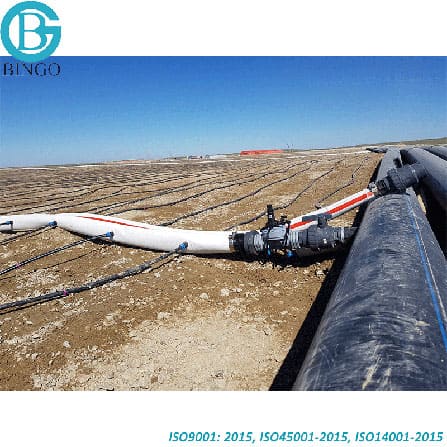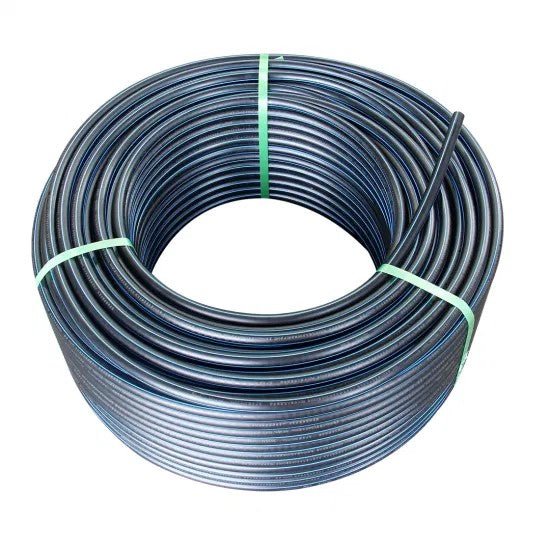How American Plastics HDPE Pipe Manufacturing Maintains Sustainability
A Comprehensive Overview to the Various Uses HDPE Pipe in Building And Construction and Market
HDPE pipes have arised as a crucial part in contemporary construction and commercial applications. Their distinct properties, such as resistance to corrosion and light-weight design, make them appropriate for a wide variety of usages. From supply of water systems to farming irrigation, HDPE pipes supply solutions that improve performance and sustainability. Comprehending their diverse applications is necessary for specialists looking to enhance framework. What specific benefits do these pipes give each field?
Supply Of Water and Distribution Equipments
Water and distribution systems are vital parts of urban facilities, often depending on high-density polyethylene (HDPE) pipes for their toughness and effectiveness. These systems transport potable water from treatment centers to customers, making sure availability and security. HDPE pipes are preferred for their resistance to rust, chemicals, and extreme temperatures, which boosts their long life and minimizes upkeep costs. Additionally, their lightweight nature permits less complicated installment and transport, making them optimal for various urban and country applications.
The versatility of HDPE pipelines allows them to be set up in tight spaces and around obstacles, decreasing the demand for substantial excavation (hdpe pipe in stock Midland TX). Their smooth interior surface area decreases rubbing losses, boosting water flow prices. As cities proceed to expand, the demand for trusted water systems enhances, placing HDPE pipelines as a sustainable option for modern facilities tasks. Their tested record makes them a favored selection among engineers and city planners alike
Wastewater Monitoring and Treatment
Efficient wastewater management and therapy are essential for maintaining public health and wellness and ecological quality. HDPE pipes play a vital role in this process because of their sturdiness, resistance to corrosion, and ability to stand up to severe chemicals. These pipelines are typically used in numerous applications, consisting of sewage systems, stormwater drain, and wastewater therapy facilities. Their light-weight nature facilitates simpler installation and transportation, minimizing labor prices and time.
In addition, HDPE pipelines have a smooth indoor surface area that lessens friction loss, promoting reliable circulation rates. They are likewise less vulnerable to leakages and failings contrasted to typical materials, making sure that contaminants are had properly. In addition, their versatility permits versatility in various dirt problems, making them suitable for diverse environmental setups. As markets increasingly focus on lasting methods, the use of HDPE pipelines in wastewater management systems lines up with objectives for decreasing ecological impact and improving source healing.
Agricultural Watering Solutions
In agricultural setups, effective watering services are important for maximizing crop returns and managing water sources. HDPE (High-Density Polyethylene) pipes play an important duty in modern watering systems because of their resilience, versatility, and resistance to deterioration. Their ability to stand up to high stress makes them ideal for both surface and subsurface watering applications, ensuring uniform water circulation throughout fields.
Farmers can utilize HDPE pipes in drip watering systems, which supply water straight to plant roots, reducing waste and advertising healthy and balanced development. Additionally, these pipes are lightweight and simple to mount, decreasing labor expenses and setup time. Their lengthy life-span and low maintenance needs better enhance their appeal in agricultural practices.
HDPE pipelines are environmentally pleasant, as they can be reused and do not seep unsafe chemicals right into the soil. This makes them a sustainable choice for farmers aiming to adopt environment-friendly farming approaches while optimizing efficiency.
Industrial Applications and Procedures
Adaptability is a trademark of HDPE pipes, making them indispensable in various commercial applications and procedures. These pipes are widely utilized in chemical look here handling industries due to their excellent resistance to a large range of harsh compounds. HDPE's lightweight tectite fittings nature, incorporated with high tensile stamina, permits easy installment and long-lasting performance in requiring atmospheres.
In the oil and gas industry, HDPE pipelines play a crucial function in carrying hydrocarbons and gases, thanks to their longevity and adaptability - American Plastics HDPE Pipe Manufacturing. Furthermore, they are used in mining operations for the transport of slurry and other products, where conventional piping systems might stop working
HDPE pipelines are significantly utilized in manufacturing centers for water supply lines and wastewater management. Their capability to hold up against extreme temperature levels and stress makes them suitable for a range of commercial processes. Generally, HDPE pipelines contribute substantially to efficiency and security throughout diverse commercial applications.
Stormwater Management and Drain Equipments
Stormwater management and drain systems are critical elements in city infrastructure, created to manage excess rainfall and minimize flooding threats. High-density polyethylene (HDPE) pipes are progressively made use of in these systems due to their toughness, flexibility, and resistance to corrosion. These pipes effectively deliver stormwater far from booming locations, minimizing surface runoff and preventing waterlogging.
HDPE's lightweight nature helps with simpler setup, reducing labor costs and construction time. Additionally, its resistance to chemicals and environmental stressors assurances long life and integrity in numerous environments. In addition to conventional drainage applications, HDPE pipes are also employed in innovative solutions such as green framework, which includes rainfall gardens and permeable pavements.

Regularly Asked Inquiries
How Does HDPE Pipe Compare to PVC Pipeline in Price?
As a whole, HDPE pipe tends to be much more costly than PVC pipeline as a result of its boosted durability and flexibility. Nevertheless, long-lasting expense factors to consider, such as upkeep and next life-span, may favor HDPE in particular applications.

What Is the Lifespan of HDPE Pipeline Under Diverse Conditions?
HDPE pipelines typically have a lifespan of 50 to 100 years, relying on ecological problems, setup techniques, and use. Aspects such as temperature, dirt kind, and direct exposure to chemicals can considerably influence their durability.
Can HDPE Piping Be Recycled After Usage?
Yes, HDPE pipes can be recycled after usage. The recycling procedure includes melting down the product, permitting it to be repurposed into new items, thus promoting sustainability and lowering environmental impact connected with plastic waste.
Are There Any Details Setup Difficulties With HDPE Pipes?
Installment challenges with HDPE pipelines consist of proper jointing techniques, making certain appropriate trench conditions, and managing thermal development. Furthermore, proficient labor is needed to handle specialized devices, which can complicate the installment process in various atmospheres.

What Qualifications Should I Look for When Acquiring HDPE Pipings?
When purchasing HDPE pipelines, one should search for qualifications such as ASTM, AASHTO, and ISO, which confirm quality and conformity with market requirements, assuring longevity and performance in various applications. - Texas hdpe pipe manufacturer